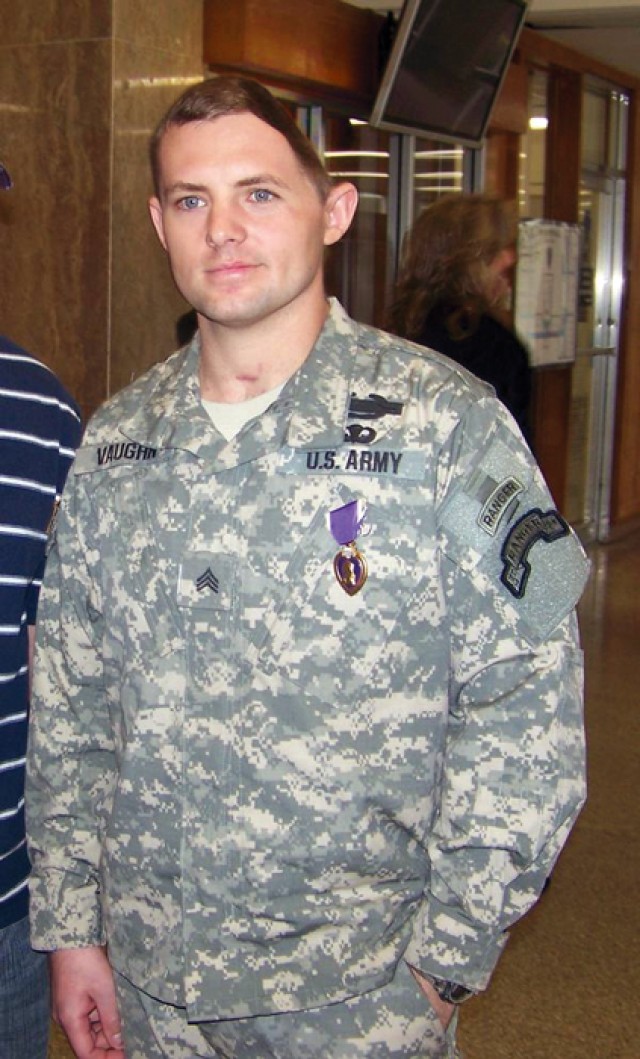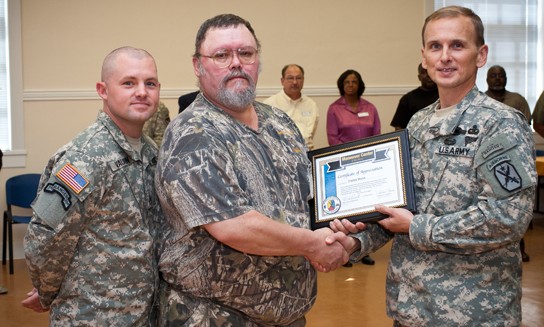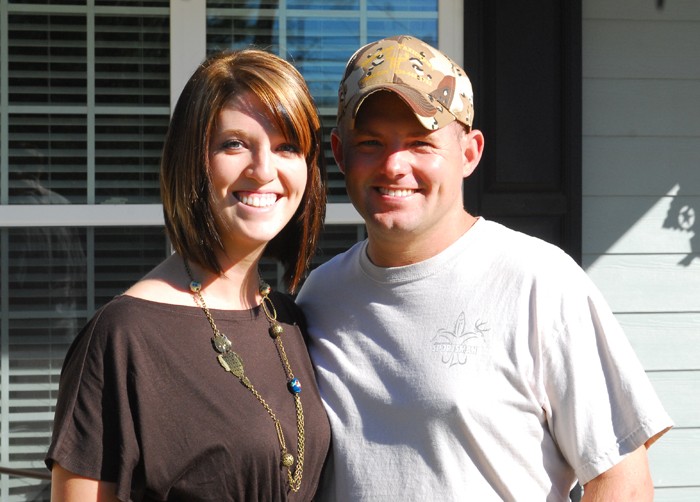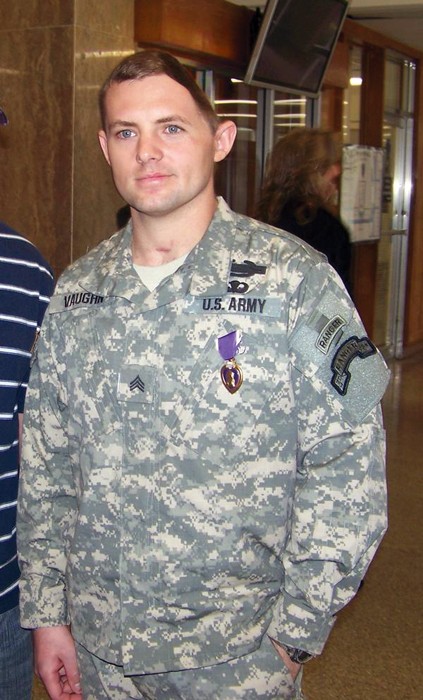FORT BENNING, Ga. - Three years ago, Staff Sgt. Chance Vaughn didn't know what direction his Army Ranger career would take him. The then 25-year-old squad leader was approaching his final year of service with multiple combat deployments under his belt and a wife at home. He had a decision to make: stay in or get out.
In October 2007, an insurgent with a .45-caliber pistol made it for him. As Vaughn and his squad breached a house in Mosul, Iraq, being investigated as a possible terrorist cell, an insurgent sprayed bullets across the room, shooting Vaughn twice. The first bullet struck his left arm, the second hit near his left eye, traveling the outer edge of his skull.
Following emergency surgery at Balad Airbase, Iraq, and evacuation to Landstuhl Regional Medical Center in Germany, Vaughn was flown to Washington, D.C., and his wife, Jennifer, met him there.
Since that day, Vaughn has walked the long road of recovery. The brain injury stunted his speech and literacy skills and affected his memory. With a piece of his skull missing, the left side of his head caved in until he underwent surgery to place a titanium mesh plate over the missing half.
He's relearned basic tasks, such as walking, running and dressing himself but he still has difficulty reading and writing. He suffers from post-traumatic stress disorder. The right side of his body is weak as a result of his brain injury. In December, he medically retires.
"A year ago, I was so sad. I missed the Army," said Vaughn, who spent five years with the 3rd Ranger Battalion, 75th Ranger Regiment. "I've been deployed six times. Some times were bad, we lost great friends, but we did a good job. Right before I got hurt I had my own squad and I loved it. For a while after I got hurt, I tried to stay in. But I can't run, I can't do pushups, the whole right side of my body is very weak."
Despite having earned a degree in criminal justice in 2004, Vaughn can't remember it. At first, he was interested in learning to be a state trooper or wildlife agent but was told his severe injuries made him a liability, Jennifer said.
"I said to myself 'what are you going to do, man''" Vaughn said.
The answer came in the form of a Phenix City taxidermist.
Peggy Guderian, a registered nurse and case manager for the Warrior Transition Battalion, has been working with Vaughn since he returned to Fort Benning. Most of her caseload involves wounded Rangers. Part of her job, she said, is to help Soldiers like Vaughn either return to duty or transition to civilian life as smoothly as possible. When Vaughn, an avid hunter, expressed an interest in learning taxidermy, Guderian began making phone calls.
Her first call was to the Care Coalition, an agency that supports and advocates for Special Operations Forces' wounded, ill and injured service members. The organization arranged and paid for Vaughn to attend a weeklong course in Macon, Ga., on taxidermy earlier this year.
Vaughn returned from the trip wanting to learn more, she said.
So Guderian hit the local phone book and started dialing up taxidermists in hopes of finding someone willing to let him come watch them work and possibly do some hands-on training.
After a few phone calls, Guderian said she was disheartened.
"They wanted to know how much they would get paid for helping him," said the case manager.
She continued to make calls until she reached Freddy Wynn of Treebark Taxidermy in Phenix City.
Though he's never served in the military himself, Wynn, a Columbus native, said he appreciates the sacrifice the Soldiers and their families must make.
When Guderian called him with a request to help a wounded Soldier, Wynn said he didn't hesitate.
Wynn, a Harris County High School graduate, has been in the taxidermy business since 1975 and has owned his own shop off of Highway 80 for the past 18 years. He's enjoyed hunting at Fort Benning for more than 30 years.
For the last five months, Vaughn has come to Wynn's shop three to four days a week, in between juggling doctor's appointments and meetings with his case manager.
At first, Vaughn said he had to take extensive notes and make lists of equipment, techniques and instructions because he would forget much of what Wynn showed him. As his memory skills have improved, Vaughn said he's managed to rely less on the lists.
"First time he came over here, he was here three hours and had to ask me my name five times.
His short-term memory wasn't working correctly. But now he's doing much better. There's an improvement every time he does something different," Wynn said. "He still forgets here and there but if he does, he goes back to his lists."
Wynn said he's taught Vaughn how to put a deer on a display mount, starting from when the deer is first picked up from the processing plant. The process can take anywhere from three weeks to six months depending on how busy the store is and how long the animal takes to dry out.
"I've been showing him the shortcuts I learned on my own - which is kind of hard because he's a lefthander," said Wynn, who's right-handed. "So when I show him one way, he has to learn to do it the other way."
The two have also become hunting buddies.
Vaughn hopes to take his newfound knowledge of taxidermy with him when he and his wife head back to their hometown of Denham Springs, La., at the end of December.
Jennifer said it's a relief to see her husband has found something he enjoys that gives him the freedom to make his own hours.
"He can work at his own pace so when he gets tired or stressed he can just quit for the day," said Jennifer, citing Vaughn's PTSD and anxiety issues. "It can give him a livelihood instead of just having to sit at home and watch television all day."
Wynn's generous contribution of time and energy did not go unnoticed by key leaders at Fort Benning, said Vaughn's case manager. She nominated him for the inspired leadership award, which he received Oct. 21.
"I was touched by his willingness to take Sergeant Vaughn under his wing," Guderian said. "I have seen a positive change in (Vaughn) - from 'I don't know what I'm going to do' to 'this is what I'm going to do.'"
Jennifer said she will always be grateful.
"I'm really glad Freddy came into our lives."






Social Sharing